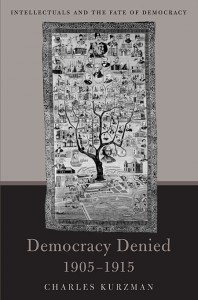Democracy Denied
 Charles Kurzman, Democracy Denied, 1905-1915: Intellectuals and the Fate of Democracy (Harvard University Press, 2008).
Charles Kurzman, Democracy Denied, 1905-1915: Intellectuals and the Fate of Democracy (Harvard University Press, 2008).
On Monday, October 30, 1905, late in the afternoon, Tsar Nicholas II of Russia signed a one-page document promising to respect civil rights, share power with a parliament, and hold free elections. “There was no other way out than to cross oneself and give what everyone was asking for,” Nicholas wrote to his mother two days later. This was the first revolution covered “live” by international telegraph services, and the news quickly spread around the world. In Portugal, the pro-democracy newspaper The World published its first comment on Wednesday, cautiously worrying about the tsar’s real intent: “Hopefully a bloody deception will not follow [the Russian people’s] generous hopes!” On Friday, the North-China Herald in Shanghai called the event “remarkable.” The chief Iranian pro-democracy newspaper, The Strong Bond, published in Calcutta, India, mentioned the manifesto the following Monday. In mid-November, a pro-democracy socialist in Hong Kong commented, “the great ferment of the Russian Revolution has affected the entire globe like a clap of thunder.” An Ottoman pro-democracy paper, resuming publication in December in Cairo after a long absence, fulfilled its “duty, as staunch liberals, to send a fraternal salute to the champions of liberalism who are even now struggling in the vast Russian empire in the name of the Rights of Man and Citizen.” Thus began a global wave of democratic revolutions. More…
Q & A on Democracy Denied with Jerry Bowyer, The American Entrepreneur radio network, August 15, 2011.